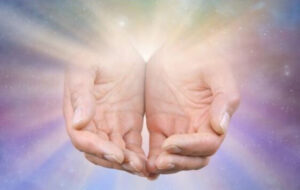Unconditional self-love and its special significance in the present and future times
An essay by our dear friend and soul brother Robert Alexander
The goal of human life is to create a life of one's own choosing, i.e. to become self-creative. How does this work in practice?
We can do this through our thoughts, words, actions, feelings, ideas, beliefs and affirmations. This is consciousness, or rather vibrations, which determine our lives by flowing into the universe and from there back to us. In other words: What a person sows, that he will reap. It is a clear, understandable statement that asks us to consider whether we also want to experience our sowing as a harvest.
This requires constant attention and mindfulness to the above activities, especially the words we use and speak. Were they really the words we wanted to speak or were they words of arrogance, haughtiness, lying out of fear, envy, jealousy or hurtful ones that if we had been mindful we would never have said. What was the motive of these words? Do we not want to replace them with loving words that respect, honour and cherish?
Of course, this process takes time. God's task in this is not to influence the circumstances or relationships of human life that has come about through our sowing, rather it is our task to take responsibility ourselves in this regard. God would violate our free will if he interfered with our creation. The human question "How could God allow this?" thus fails to recognise the relationship between God and his creatures. God only explains to us the consequences of our behaviour.

He created man in his own image. The rest man has created himself through the creative power of sowing. God has also given man the free choice to deal with his life according to his own will. He has no preferences in this. In the above sense, God's will and man's will thus coincide, and this has something to do with God's unconditional love for man.
Sometimes it can be hard when people have to take responsibility for their seeds.
Man is the most remarkable, glorious and splendid creation ever created by God. If you knew this and could internalise it, you would no longer fear or dread death. You would also know that you are unconditional love, just as God your Creator is - man is an image of God. Not even God himself could find fault with his image, for God is perfect and so is his creation.
But where does man get the idea that he would be much less great? Mostly from the people he loves most, from his parents, and they in turn have taken it from their parents. Here we were too loud, there too quiet, for them. You can't do that and you can't do the other, they tell us. In the exuberance of our feelings, they have rebuked us and stopped us from some of our boldest ideas and visions.
We were occasionally even threatened with punishment for not doing things we wanted to do. Their love for us was conditional, forcing us to do or not do things we did not want to do.
On the subject of sexuality, you may have experienced your parents banishing you or condemning you and inflicting violence. Who does not know the pain that this created in us? We then took all these experiences with us into our love relationships, and that had consequences.
The behaviour of our parents was often not exactly beneficial to our self-confidence and self-love. In religions, we are told that God is a loving God, but if we transgress his commandments, we must expect punishment, including damnation and banishment. Already in childhood, we were put in fear with this. This fear-based reality of love dominates our experience of love, and indeed is created by it.
We have forgotten what it was like in the realms from which we once came (before our incarnation), where we were loved unconditionally by God. Here on earth, we have projected the "parental role" onto God and this has led us to our image of God, which includes a God who judges, punishes or rewards depending on how well he likes what we have done or how well we have obeyed his commandments. An image of God based on human experience rather than spiritual truths. Not even God will find fault with his creation - the human being - because his creation is perfect.
Self-confidence and self-love are not exactly promoted under these circumstances.
When we choose the action that love instils in us, we will do more than just survive, more than just win, more than just succeed. Then we will experience all the glory of who we really are and who we can be. The deepest secret is that life is not a process of discovery, but a process of creation. Therefore, do not strive to find out who you are, but strive to decide who you want to be. A fact that few know, let alone accept.
The soul has only one desire, it wants to transform its grandest concept about itself into its grandest experience and that is God's self-experience at the same time. What a grandiose task for us human children!
God gave each of the countless parts of Himself (sparks of spirit - which also include human beings) an individuality, and thus also an I AM, called the small I AM. It was given the same power to create that God possesses as a whole (the great I AM). God's aim in this was to come to know Himself as God through His spiritual descendants, the children of men. He cannot do this in any other way than through us. God's goal in this is that we humans recognise ourselves as part of God. What is new this time, however, is that this part of God (human being), which has successfully gone through the incarnation process, now also possesses the power and creativeness of God. However, in order for this process to be successful, a prerequisite was needed: the human being was initially not allowed to recognise himself as God during the incarnation process. This phase is over, however, and therefore also the legitimisation of religions as we still know them today.
I now come to the actual topic, the core of the essay, namely the importance of self-love in our time, the transition, into another, higher consciousness.
Some call it the 5th dimension, Aquarian Age, Christ Consciousness, etc. In any case, it is an age in which love reigns. A love that flows from the inside out and not the other way around.
The main commandment in Christianity is: Love your neighbour as yourself and God above all. Here the importance of self-love is emphasised once again. Self-love is the prerequisite for loving God and one's neighbour.

When a sick person seeks healing, not loving oneself is an extreme hindrance to the healing process. It drains one's life energy because one denies one's true nature (as detailed above). Why does self-love continue to be so significant at this time? It helps us to raise the overall vibration of the planet. By raising the vibrations of our subtle bodies, even if it is only through our mental body, this is already of enormous effect and is a permanent love vibration emanating from us.
Only now can we love God, our neighbour and our partner, for they are all one! It is also the prerequisite for entering the next dimension.
In summary, we humans are unconditional love, just like God is, because we ourselves are part of God. The beauty of it is, we don't need to do anything to be able to love unconditionally, because we are unconditional love. The only thing we need to do is to remember it again!
Then Mother Earth will receive a huge boost of love for the Ascension enterprise when the many spiritual people who do not yet love decide to love themselves. I hope that I could inspire many of you to do this.
To support this, the following affirmation, whereby you can also stand in front of a mirror and look into your own eyes. The inner child is happy!
I love myself.
I love myself as I am.
I love myself with my so-called good and bad sides.
I love myself with my so-called dark and light sides.
I am wonderful.